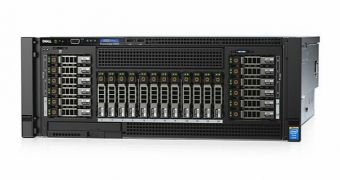Solid-state drives are naturally faster than hard disk drive units, in all forms, but the PCI Express models are always the best in that area, and that only makes breakthrough in this field even more impressive. The latest such breakthrough comes from Samsung.
Seeing as how Samsung has always been one of the foremost authorities on solid-state technology, it was bound to invent something revolutionary sooner or later.
The newest solid-state drive to leave its labs doesn't exactly scream miracle, but it does leave all others in the dust when it comes to transfer speed.
After all, PCI Express SSDs are considered super-fast when they near 2 Gbps transfers, but the SFF-8639 NVMe PCIe SSD reached a full 3 Gbps.
The newcomer is the world's first PCIe (Peripheral Component Interconnect Express) SSDs using an NVMe protocol (non-volatile memory express).
The 3,000 Mbps speed is correlated to a random 4K read rate of 750,000 IOPS (input output operations per second), which is the equivalent of conventional high-end SAS 12 Gbps SSDs multiplied by a factor of 3.
In layman terms, that means that the new 2.5-inch SFF-8639 NVMe PCIe SSD can process random read data three times as fast as SAS 12 Gbps models, which leads to 25% more IOPS per watt.
Add to that “power loss protection” and there is little chance that the information will be lost when data issued by the host system is written to storage media during a power failure.
And power failure has always been a problem for storage devices, especially when it comes to servers, data centers and larger systems.
HDDs tend to be particularly corruption-prone in this situation, and while SSDs are better (they are made to store data in absence of sustained electrical flow or magnetic field), they aren't exactly perfect at quickly saving data when power is cut either. Only preserving what they can hold onto in a pinch.
The "power loss protection" in Samsung's latest invention mitigates that flaw somewhat, even if it's not a perfect solution.
Samsung’s SFF-8639 NVMe PCIe SSD has a capacity of 1.6 TB and can already be found in the Dell PowerEdge R920 server. If the company (Samsung, not Dell) decides to offer the drive through retail, it hasn't said when it will happen or for what price, so we can only wait and hope. If it does make it to market, it will be in 400 GB and 800 GB versions as well.

 14 DAY TRIAL //
14 DAY TRIAL //